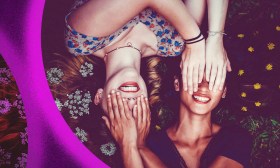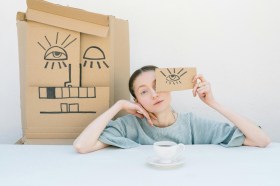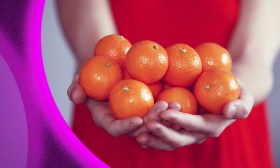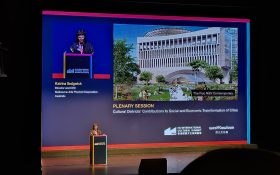In this FREE journey to creative recovery, we’re following Julia Cameron’s bestselling creativity self-help manual, The Artist’s Way, tracing the book’s 12-week program with a series of inspiring ArtsHub articles, resources and ideas for artist-date activities. There’s also a Facebook community group you can join for discussion and support.
To recap, the idea with The Artist’s Way is to commit yourself to a structured creative recovery that will spark joy, remove blocks and build the confidence to play and take risks – whether you’re a professional artist or not. The main tools of the course are Morning Pages and Artist Dates. You can read previous articles here:
- Introduction: an invitation to change your life
- Week 1: Recovering a sense of safety
- Week 2: Recovering a sense of identity
- Week 3: Recovering a sense of power
Or you can jump right in and follow along, wherever you are in the process. Grab a copy of the book, start reading and look out for ArtsHub’s weekly articles, published each Monday.
Keep up to date with The Artist’s Way series here
Week 4: Recovering a sense of integrity and grappling with new self-awareness
Morning Pages, done over an extended period of time, perform a kind of ‘spiritual chiropractic’, writes Julia Cameron. They realign our values and point us towards the truth of what we really feel, what we want and who we are.
These emerging truths may be uncomfortable and inconvenient. For example, ‘I’m unhappy in my marriage. I need a new job. And I drink too much.’ Such realisations demand that we change, and change is scary.
Instead of fooling ourselves that we feel “OK”, the daily process of Morning Pages gives clarity and invites specificity. Cameron says it’s like cleaning the mirror, taking a swipe at the blur we have kept between us and our real selves.
As the image in the mirror becomes clearer, we may be surprised and unsettled but, for an artist, seeing the truth clearly is never a mistake.
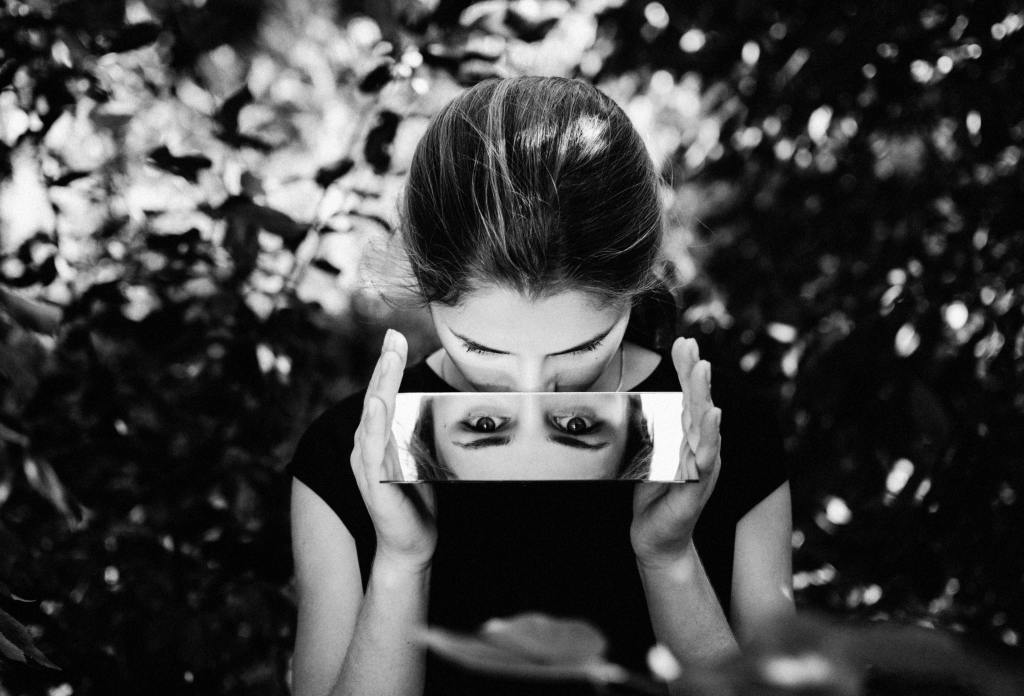
Honest changes
How is this relevant to being an artist? Cameron quotes Chekhov who says, ‘If you want to work on your art, work on your life.’
Art is all about self-expression, and The Artist’s Way is about discovering and reconnecting with that authentic self that must be expressed.’ As we gain – or regain – our creative identity, we lose the false self we were sustaining,’ writes Cameron. ‘The loss of this false self can feel traumatic: “I don’t know who I am anymore. I don’t recognise me.”‘
Existing in this space of not quite knowing yet, but sensing the need for (sometimes massive change), is this week’s work. According to Cameron, it’s not uncommon, at this stage of the recovery process, to experience a profound shift in tastes, perceptions and identity. This could involve the urge to throw out old clothes and clean out cupboards. To chop off our hair. There may be experiences of intense grief for what has passed, or excitement as we make space for something new and unknown.
Or perhaps there’s no visible change at all, but if you’re writing Morning Pages and going on Artist Dates, things are definitely shifting and moving beneath the surface.
Reading deprivation and excavating buried dreams
The main challenge set in this week’s chapter is the dreaded Reading Deprivation. Here, we are asked to give up reading, as much as possible, for the whole week. This is designed as a jump-start to creativity, starving us of the words of others and forcing us to find other things to do with our time.
As Cameron says, ‘For most artists, words are like tiny tranquilisers. We have a daily quota of media chat that we swallow up. Like greasy food, it clogs our system. Too much of it and we feel, yes, fried.’
Reading deprivation is a powerful tool, but a difficult one. Ideally, we could turn off our phones and computers for the whole week and eschew novels at night before bed. But work, study, dependent family members – all these things require us to remain at least somewhat connected to words.
Cameron notes how resistant most students are to this idea – how everyone insists that they are the exception to the no-reading rule. (My example: I write for work and need to read the news! I’m required to post on social media! The edits on my novel are due this week from my publisher, so I’ve got to read emails and work on the manuscript!)
The trick here is to do what you can. Choose your battles. Plan wisely and bravely. Stretch a little. In the week ahead, I commit to restricting social media posts to essential work-related activity and avoiding books, magazines and Substack newsletters. I will forgo the nightly ritual of doing the newspaper’s Trivia Quiz with my family. And I will stop listening to podcasts on my walks.
This is going to be hard! But I’ll be signalling to myself that it’s possible to change and be quiet with my own thoughts.
Ask yourself, what reading could you give up for a short time? What activities might you do in its place? Cameron offers a list of activities people may try when they’re not reading – and note how it’s not necessary that these are “creative” or artistic. They include:
- listening to music
- making curtains
- mending and knitting
- cooking
- fixing broken items
- cleaning
- sorting bookshelves (dangerous!)
- working out
- painting
- repotting plants, and
- visiting friends.
My personal journey with ‘The Artist’s Way’ this week
After last week’s half-arsed Artist Date, I was determined to do it properly – if nothing else, so I could report on it, like a Good Student.
I chose an activity I was longing to do, and one I was a little bit fearful of. Don’t laugh – going to the beach all on my own for a swim! This is something I haven’t done in decades, despite the fact the beach is my happy place, and it’s only a 12-minute drive from where I live.
The ocean always inspires me, yet something keeps me away from it, unless I’m with friends or a family member. What’s going on there?
The day dawned hot and bright. I was looking forward to it. All the elements were coming together for a good two-hour solo session at Williamstown Beach. I didn’t have to work that day, my dentist appointment had been postponed and I had access to the family car.
But something happened when my 21-year-old son asked to use the car himself to go snorkelling with his mate. I felt terribly guilty and selfish. I wanted to cancel my own visit, postpone and try a tamer artist date that I could do without leaving the house or inconveniencing anyone.
I noticed, with curiosity and amusement, the resistance I was feeling, all the excuses I was making to myself. I recognised this process from all the times I try to write something creative without an external deadline attached to it.
How interesting.
I steeled myself against the sirens of self-abnegation, driving to the beach like the most determined and intrepid traveller. I even stopped to pick up a packet of Twisties on the way – remembering Julia Cameron’s advice to tap into the things we loved as kids and treat ourselves.
Eating those salty snacks as I lay on on my towel, I noticed how they didn’t sit so well in my ageing gut, but they were yummy. Later, floating in the cold green water, I watched small white clouds drifting in the sky, forming and reforming into patterns. I found myself wishing my partner was there beside me to point out the dragons and elephants, and to commiserate with my annoyance at fellow beach-goers who bring boom boxes.
I noticed my self-consciousness about being a woman alone at the beach. A sense of being watched by the leathery old men observing the parade from behind mirrored sunglasses. But along with self-consciousness came a more intense experience of the available sensory detail. The laughing mother throwing a ball to her toddler and speaking in French; the bright orange beach umbrellas in the distance; the startling round bottoms of teenage girls in G-string bikinis, reminding me of baboons in the zoo. These are the kinds of specific details that feed storytelling and they’re most vivid when I’m alone.
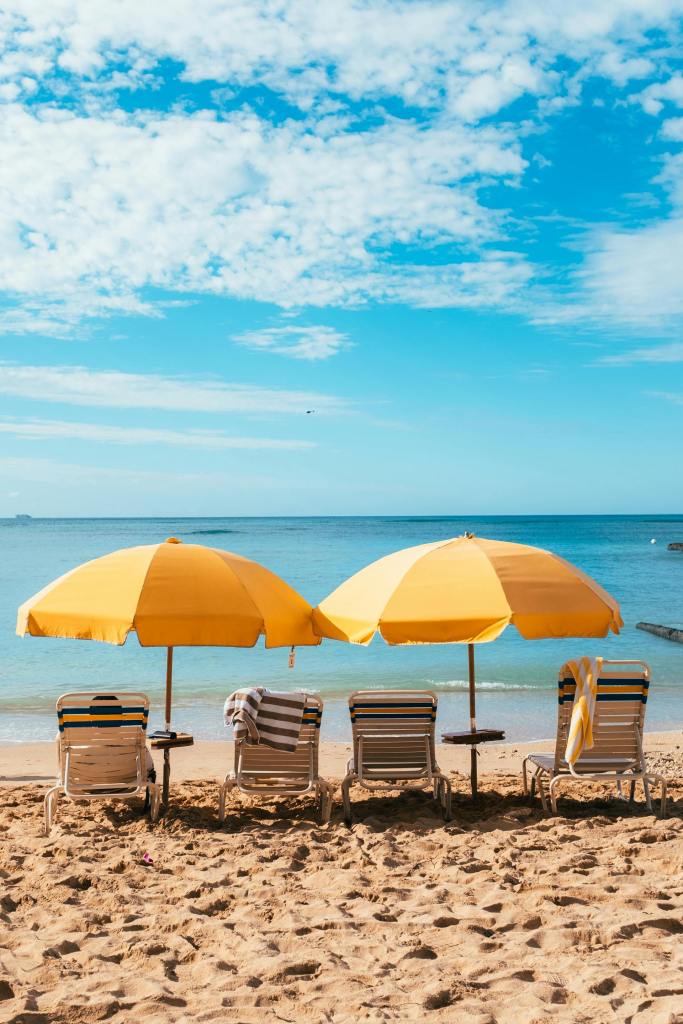
Selfishness, art monsters and knowing when to fight for your right not to party
Claire Dederer, in her excellent Paris Review essay What do we do with the art of monstrous men? writes about the role of selfishness in art. This week, the following passage struck me fiercely:
‘There are many qualities one must possess to be a working writer or artist. Talent, brains, tenacity. Wealthy parents are good. You should definitely try to have those. But first among equals, when it comes to necessary ingredients, is selfishness. A book is made out of small selfishnesses. The selfishness of shutting the door against your family. The selfishness of ignoring the pram in the hall. The selfishness of forgetting the real world to create a new one. The selfishness of stealing stories from real people. The selfishness of saving the best of yourself for that blank-faced anonymous paramour, the reader. The selfishness that comes from simply saying what you have to say.’
At the close of the essay, Dederer asks: ‘Are all ambitious artists monsters? Tiny voice: [Am I a monster?]’
It’s a good question and we should keep asking it. But I suspect many of us, especially women, need a little more monster and a little less martyr. I would argue there is such a thing as “sacred selfishness” – the healthy and self-preserving instinct that fights for solitude and self expression. In most instances, this is not, ultimately, at odds with being a good human being.
Discernment is what’s required – to know when it’s the right time to put yourself first – and trying to develop this sense of discernment is one of the big lessons for me as I undergo this round of The Artist’s Way.
And lest I’ve painted myself as a self-sacrificing martyr, anyone who lives with me knows I am my own kind of art monster, but that I go to great lengths to hide it from myself. But this time, I’m trying to clean the mirror.
Rest, Reading Deprivation and taking a week’s breather
Over on our Facebook group, I ran a poll this week about what people were finding most difficult about the course. It was a small sample, but 37% said Artist Dates and 29% said Morning Pages. There has been a general sense of falling behind and not having enough time to do all the required readings and tasks. I feel this too. With Easter coming up, we’ve made the decision to insert a rest week in the program to coincide with Reading Deprivation.
Our next article – Week 5: Recovering a sense of possibility – will be published on Monday 8 April. Hopefully this gives everyone a chance to breathe, consolidate and maybe even make some art. We’ll be continuing to post encouragement and ideas in the group, and hope you keep doing your Morning Pages and Artist Dates and letting us know how you’re faring.
Finally, two powerful affirmations to keep you strong as you undergo shifts in identity: ‘I trust my perceptions’ and ‘a stronger and clearer me is emerging’.
Other resources
- Everything I learned from (finally) finishing The Artist’s Way, by Madeleine Dore.
- Check out ArtsHub Events listings with options in all states – activities including art exhibitions, theatre, dance, writing festivals.
- Visit ArtsHub‘s The Artist’s Way Community Facebook group to share your journey, connect with others and ask questions. We’d love to hear from you.


